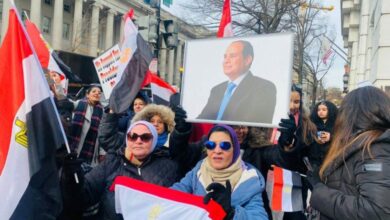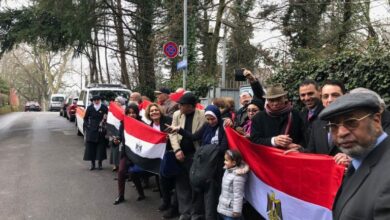Egyptians staged protests in Cairo as well as several North American and European cities on Saturday, demanding the right to vote from abroad.
The Front for the Defense of the Vote of Egyptians Abroad – also known online as the “Right2vote” campaign – organized the global protest amid continuing ambiguity over whether expatriate Egyptians will be allowed to vote in Egypt's upcoming parliamentary and presidential elections.
Outside the People’s Assembly in Cairo Samir Alish said the protest was for “building a new era in Egypt, one in which all Egyptians have equal rights.”
Around 30 people took part in the protest. Hala Amin said she was protesting in solidarity with Egyptians abroad.
“I’ve come to demand a mechanism to allow Egyptians abroad to vote. They represent 10 percent of the population and contribute to the national economy – and they are Egyptian. This is a basic right,” Amin said.
“They’re telling us that there’s no mechanism by which Egyptians abroad can vote but this isn’t true – there’s electronic voting and voting by mail. We need a specific timeframe and a final decision on this,” she added.
After decades of Egyptian emigration – primarily to the Gulf but also to North America, Australia and Europe – there are now an estimated 10 million Egyptians living abroad, amounting to an important electoral constituency.
Remittances sent by Egyptians abroad represent one of the country’s main sources of income, yet Egyptians outside the country’s borders are denied the right to take part in the country’s political life.
Protester Moein Mokhtar said he and others had filed a legal case demanding the right “under his royal highness King Hosni Mubarak”, but that it went nowhere.
“But the revolution taught us peaceful ways of protest and that these ways are successful,” Mokhtar said, adding that “all protesters want is a green light from the ruling Supreme Council of the Armed Forces (SCAF) for voting to go ahead.”
Rather than a green light, there have instead been mixed signals from the government.
In May SCAF General Mamdouh Shaheen said that the first article of the amended Law on the Exercise of Political Rights recognizes the right of all Egyptians to exercise their political rights and that “being Egyptian rather than an address” is the deciding factor.
Shaheen added, however, that in practice there are logistical and financial problems impeding the implementation of these rights.
In June Assistant Foreign Minister for Consular Affairs Mohamed Abdel Hakam said Egyptian expatriates will not be able to vote from abroad, while most recently head of the High Elections Commission Abdel Moez Ibrahim was quoted as saying that the decision has to be taken by a “higher authority than the [High Elections Commission].”
Ibrahim had previously said in August that “any Egyptian who wants to vote is welcome to come to Egypt and do so.”
Logistical issues are not a valid reason for denying Egyptians a basic right, protesters said.
Speaking on his way to a protest in Ontario from Toronto, Right2vote member Khaled Elsharkawi said, “No country as important as Egypt uses these reasons as an excuse.”
Elsharkawi described the four possible ways in which voting abroad could be organized: by mail, electronic voting, through a representative in Egypt, or voting at embassies.
The first three options would require an amendment of the existing law, as the current legislation requires judicial supervision of the voting process, Elsharkawi explained. He added that voting at embassies would necessitate judges to be flown out to supervise the ballots.
In addition to being costly, judicial supervision at embassies poses a challenge in terms of available manpower. Egypt has approximately 9000 judges who will be stretched out to cover all of Egypt's polling stations.
To solve this problem, Egyptians abroad can vote early or judges can delegate supervisory powers to consulate staffs, both of which solutions would require a change in the law, Elsharkawi said.
The number of Egyptians in some countries will also pose a logistical – and political – headache.
Saudi Arabia hosts over one million Egyptians and forbids large gatherings of a political nature. Several protesters suggested that the sight of long lines of people, from a country that has recently undergone a revolution against a repressive leader, engaging in a democratic process would be unacceptable to Saudi authorities.
Elsharkawi advocates voting by mobile text message as a way to solve these issues. On Twitter he described the method as “cheap, secure, easy, fast, fair and safe in comparison to other mechanisms.”
Electronic voting – whether online or via text message – has been criticized as insecure and vulnerable to electoral fraud, but for today’s protesters the mechanism is less important than a clear expression of political will from the SCAF and the civilian government in favor of voting from abroad – and the absence of which has been interpreted in several ways.
Elsharkawi suggested that the decision might be influenced by a desire not to upset Gulf countries with a large Egyptian expatriate presence.
Tarek El-Arabi, a postgraduate student from Canada who protested in Cairo on Saturday, said the SCAF might be reluctant because of “unexpected incidents” that might result from giving the vote to a large group over which it exercises no control.
Mohamed El-Rayyan, vice president of the General Union of Egyptians Abroad, a group formed in 1985 to lobby for the rights of Egyptian expatriates, said he met the head of the High Elections Commission and “failed to get from him an answer as to why Egyptians abroad are excluded from the right to practice their political rights under the law.”
El-Rayyan asked how it is that his son – who resides in Spain but is currently serving military service in the Egyptian army – can be denied the right to vote but be expected to perform his obligations as an Egyptian citizen.
“But from what I understood, [Ibrahim] said the political will for us taking part in elections doesn’t exist,” El-Rayyan said.



